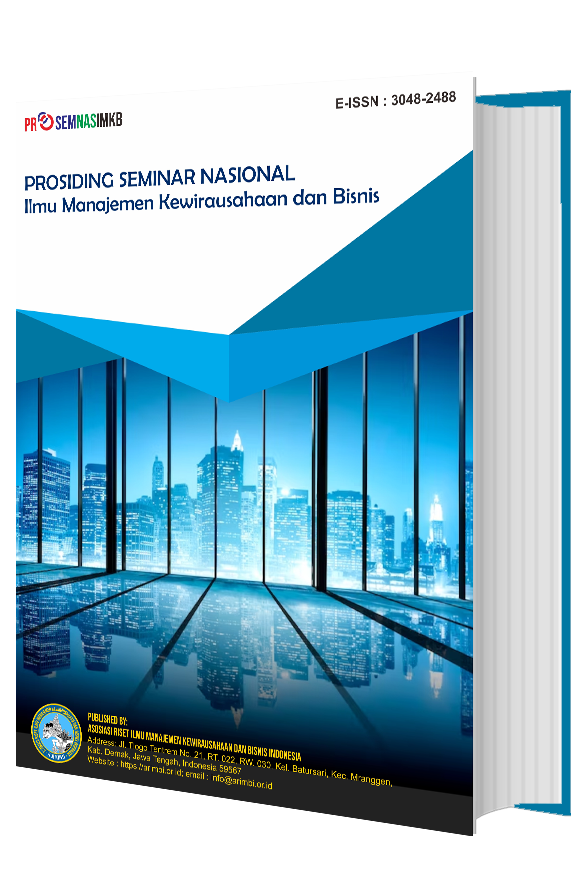Green Digital Management: Strategi Bisnis Berkelanjutan Bagi UMKM di kampong Bharu, Kuala Lumpur
DOI:
https://doi.org/10.61132/prosemnasimkb.v2i2.202Keywords:
MSME Digitalization, Green Business, Kampong Bharu, SustainabilityAbstract
Digital technology has become an essential part of managing small and medium-sized enterprises (SMEs), especially in efforts to achieve business sustainability. Kampong Bharu, as an iconic area in Kuala Lumpur, is home to numerous micro, small, and medium-sized enterprises (MSMEs) operating in the culinary, craft, and tourism sectors, but faces challenges in implementing environmentally friendly practices. This research aims to analyze the application of green digital management to MSMEs in Kampong Bharu as a sustainable business strategy. The research method uses a qualitative approach with in-depth interviews and participant observation of 15 MSME actors. The research results show that integrating digital technology with environmentally friendly principles, such as paperless digital marketing, energy-efficient use, and sustainable packaging systems, can enhance the competitiveness and positive image transformation of MSMEs. This finding has practical implications for business owners and stakeholders in developing a digital-based green MSME model in historic urban areas.
Downloads
References
Abedin, B., & Sundarasen, S. D. (2021). Digital transformation and sustainability of SMEs: A systematic review. Sustainability, 13(21), 11864. https://doi.org/10.3390/su132111864
Adams, R., Jeanrenaud, S., Bessant, J., Denyer, D., & Overy, P. (2016). Sustainability‐oriented innovation: A systematic review. International Journal of Management Reviews, 18(2), 180–205. https://doi.org/10.1111/ijmr.12068
Bai, C., Quayson, M., & Sarkis, J. (2021). Corporate sustainability development in the context of digitalisation: A review. Sustainable Production and Consumption, 26, 1439–1451. https://doi.org/10.1016/j.spc.2020.12.033
Bharadwaj, A., El Sawy, O., Pavlou, P., & Venkatraman, N. (2013). Digital business strategy: Toward a next generation of insights. MIS Quarterly, 37(2), 471–482. https://doi.org/10.25300/MISQ/2013/37:2.3
Bocken, N. M. P., Boons, F., & Baldassarre, B. (2020). Sustainable business model experimentation by understanding ecologies of business models. Journal of Cleaner Production, 295, 126361. https://doi.org/10.1016/j.jclepro.2020.126361
Braun, V., & Clarke, V. (2022). Thematic analysis: A practical guide. London: Sage.
Creswell, J. W., & Poth, C. N. (2018). Qualitative inquiry and research design: Choosing among five approaches (4th ed.). Thousand Oaks, CA: Sage.
Dangelico, R. M., & Pujari, D. (2021). Mainstreaming green product innovation: Why and how companies integrate environmental sustainability. Journal of Business Ethics, 168(2), 1–26. https://doi.org/10.1007/s10551-019-04162-x
Elkington, J. (1997). Cannibals with forks: The triple bottom line of 21st century business. Capstone. https://doi.org/10.1002/tqem.3310080106
Goyal, P., Rahman, Z., & Kazmi, A. A. (2020). Corporate sustainability performance and firm performance research: Literature review and future research agenda. Management Decision, 58(8), 1682–1707. https://doi.org/10.1108/MD-09-2019-1321
Guest, G., Namey, E., & Chen, M. (2020). A simple method to assess and report thematic saturation in qualitative research. PLoS ONE, 15(5), e0232076. https://doi.org/10.1371/journal.pone.0232076
Hart, S. L. (1995). A natural-resource-based view of the firm. Academy of Management Review, 20(4), 986–1014. https://doi.org/10.5465/amr.1995.9512280033
Jain, S., & Singhal, S. (2022). Green practices for sustainable SMEs: A systematic literature review. Journal of Small Business Strategy, 32(1), 56–72.
Khan, S. A. R., Yu, Z., & Umar, M. (2021). Sustainable digitalization: A case of SMEs in emerging economies. Journal of Cleaner Production, 285, 124827. https://doi.org/10.1016/j.jclepro.2020.12.033
Kraus, S., Palmer, C., Kailer, N., Kallinger, F. L., & Spitzer, J. (2019). Digital entrepreneurship: A research agenda on new business models for the twenty-first century. International Journal of Entrepreneurial Behavior & Research, 25(2), 353–375. https://doi.org/10.1108/IJEBR-06-2018-0425
Lim, W. M., Yap, S. F., & Makkar, M. (2021). Home-based businesses and digital technology: A systematic review. International Journal of Consumer Studies, 45(3), 373–389. https://doi.org/10.1111/ijcs.12628
Liu, Y., Wei, J., & Hu, J. (2021). Digital transformation and environmental innovation: Evidence from Chinese manufacturing firms. Technological Forecasting and Social Change, 166, 120636. https://doi.org/10.1016/j.techfore.2021.120636
Mahapatra, S., & Mishra, A. (2023). Digital green innovations for small businesses in Asia: Opportunities and challenges. Asia Pacific Business Review, 29(2), 201–220.
Maroufkhani, P., Wagner, R., & Wan Ismail, W. K. (2022). Green digital business strategy: Conceptualization and evidence from SMEs. Journal of Cleaner Production, 343, 130933. https://doi.org/10.1016/j.jclepro.2022.130933
Matarazzo, M., Penco, L., Profumo, G., & Quaglia, R. (2021). Digital transformation and customer value creation in Made in Italy SMEs: A dynamic capabilities perspective. Journal of Business Research, 123, 642–656. https://doi.org/10.1016/j.jbusres.2020.10.033
Merriam, S. B., & Tisdell, E. J. (2016). Qualitative research: A guide to design and implementation (4th ed.). San Francisco, CA: Jossey-Bass.
Nidumolu, R., Prahalad, C. K., & Rangaswami, M. R. (2020). Why sustainability is now the key driver of innovation. Harvard Business Review, 98(5), 44–52.
Patton, M. Q. (2015). Qualitative research & evaluation methods (4th ed.). Thousand Oaks, CA: Sage.
Rahman, H., & Ahmad, Z. (2020). Environmental practices among SMEs in Kuala Lumpur. Asian Journal of Business and Management, 8(4), 122–135.
Sehnem, S., Vazquez-Brust, D., Pereira, S. C. F., & Campos, L. M. S. (2019). Circular economy: Benefits, impacts and overlapping. Supply Chain Management: An International Journal, 24(6), 784–804. https://doi.org/10.1108/SCM-06-2018-0213
SME Corp Malaysia. (2022). SME annual report 2021/22: Resurgence of SMEs. Kuala Lumpur: SME Corporation Malaysia.
Troise, C., Corvello, V., Ghobadian, A., & O'Regan, N. (2022). How can SMEs successfully navigate VUCA environment? The role of digital technologies. Technological Forecasting and Social Change, 174, 121278. https://doi.org/10.1016/j.techfore.2021.121278
Wirtz, J., Zeithaml, V. A., & Gistri, G. (2021). Technology-mediated service encounters. In M. Maglio, C. Kieliszewski, J. Spohrer, K. Lyons, L. Patrício, & Y. Sawatani (Eds.), Handbook of Service Science, Volume II (pp. 377–401). Springer. https://doi.org/10.1007/978-3-030-72289-8_17
Downloads
Published
How to Cite
Issue
Section
License
Copyright (c) 2025 Prosiding Seminar Nasional Ilmu Manajemen Kewirausahaan dan Bisnis

This work is licensed under a Creative Commons Attribution-ShareAlike 4.0 International License.






